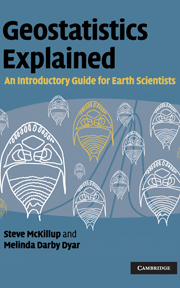Book contents
- Frontmatter
- Contents
- Preface
- 1 Introduction
- 2 “Doing science”: hypotheses, experiments and disproof
- 3 Collecting and displaying data
- 4 Introductory concepts of experimental design
- 5 Doing science responsibly and ethically
- 6 Probability helps you make a decision about your results
- 7 Working from samples: data, populations and statistics
- 8 Normal distributions: tests for comparing the means of one and two samples
- 9 Type 1 and Type 2 error, power and sample size
- 10 Single-factor analysis of variance
- 11 Multiple comparisons after ANOVA
- 12 Two-factor analysis of variance
- 13 Important assumptions of analysis of variance, transformations and a test for equality of variances
- 14 Two-factor analysis of variance without replication, and nested analysis of variance
- 15 Relationships between variables: linear correlation and linear regression
- 16 Linear regression
- 17 Non-parametric statistics
- 18 Non-parametric tests for nominal scale data
- 19 Non-parametric tests for ratio, interval or ordinal scale data
- 20 Introductory concepts of multivariate analysis
- 21 Introductory concepts of sequence analysis
- 22 Introductory concepts of spatial analysis
- 23 Choosing a test
- Appendices
- References
- Index
4 - Introductory concepts of experimental design
Published online by Cambridge University Press: 05 June 2012
- Frontmatter
- Contents
- Preface
- 1 Introduction
- 2 “Doing science”: hypotheses, experiments and disproof
- 3 Collecting and displaying data
- 4 Introductory concepts of experimental design
- 5 Doing science responsibly and ethically
- 6 Probability helps you make a decision about your results
- 7 Working from samples: data, populations and statistics
- 8 Normal distributions: tests for comparing the means of one and two samples
- 9 Type 1 and Type 2 error, power and sample size
- 10 Single-factor analysis of variance
- 11 Multiple comparisons after ANOVA
- 12 Two-factor analysis of variance
- 13 Important assumptions of analysis of variance, transformations and a test for equality of variances
- 14 Two-factor analysis of variance without replication, and nested analysis of variance
- 15 Relationships between variables: linear correlation and linear regression
- 16 Linear regression
- 17 Non-parametric statistics
- 18 Non-parametric tests for nominal scale data
- 19 Non-parametric tests for ratio, interval or ordinal scale data
- 20 Introductory concepts of multivariate analysis
- 21 Introductory concepts of sequence analysis
- 22 Introductory concepts of spatial analysis
- 23 Choosing a test
- Appendices
- References
- Index
Summary
Introduction
To generate hypotheses, you often sample different groups or locations (which is sometimes called a mensurative experiment because you usually measure something, such as air density, chemical composition or temperature, on each sampling unit) and explore these data for patterns or associations. To test hypotheses you may do mensurative experiments, or manipulative ones where you change a condition and observe the effect of that change upon each experimental unit (like the experiment with apatite and lead described in Chapter 2). Often you may do several experiments of both types to test a particular hypothesis. The quality of your sampling and the design of your experiment can have an effect on the outcome and determine whether or not your hypothesis is rejected, so it is important to have an appropriate and properly designed experiment.
First, you should attempt to make your measurements as accurate and precise as possible so they are the best estimates of actual values.
Accuracy is the closeness of a measured value to the true value.
Precision is the “spread” or variability of repeated measures of the same value.
For example, a thermometer that consistently gives a reading corresponding to a true temperature (e.g. 20 °C) is both accurate and precise. Another that gives a reading consistently higher (e.g. +10 °C) than a true temperature is not accurate, but it is very precise.
- Type
- Chapter
- Information
- Geostatistics ExplainedAn Introductory Guide for Earth Scientists, pp. 28 - 44Publisher: Cambridge University PressPrint publication year: 2010

